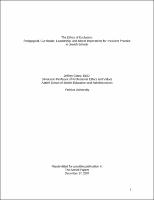Please use this identifier to cite or link to this item:
https://hdl.handle.net/20.500.12202/4604Full metadata record
| DC Field | Value | Language |
|---|---|---|
| dc.contributor.author | Glanz, Jeffrey | - |
| dc.date.accessioned | 2019-08-12T20:29:58Z | - |
| dc.date.available | 2019-08-12T20:29:58Z | - |
| dc.date.issued | 2011 | - |
| dc.identifier.citation | Glanz, Jeffrey. (2011). The Ethics of Exclusion: Pedagogical, Curricular, Leadership and Moral Imperatives in Jewish Education . In The Azrieli Papers. vol. 1. Dimensions of orthodox day school education. Edited by David J. Schnall and Moshe Sokolow. New York : Michael Scharf Publication Trust of Yeshiva University Press ; Jersey City, NJ : Distributed by Ktav Pub. House, c2011- : 203-268. | en_US |
| dc.identifier.isbn | 9781602801820 | - |
| dc.identifier.uri | https://www.yu.edu/sites/default/files/legacy//uploadedFiles/Academics/Graduate/Azrieli_Graduate_School/Research_and_Publications/Glanz%20EDITED.pdf | en_US |
| dc.identifier.uri | https://hdl.handle.net/20.500.12202/4604 | - |
| dc.description | Scholarly article reprinted in The Azrieli Papers. vol. 1 Dimensions of orthodox day school education. Edited by David J. Schnall and Moshe Sokolow. New York : Michael Scharf Publication Trust of Yeshiva University Press ; Jersey City, NJ : Distributed by Ktav Pub. House, c2011- : 203-268. | en_US |
| dc.description.abstract | Inclusive practice in education and schooling, public or private, is cutting-edge, not commonly in use. Yet, this monograph posits that such practice is a moral necessity and an ethical imperative incumbent on Jewish educators to articulate, philosophically, and to actualize, in practice. An ideological, social, political, and intellectual commitment to justice, equity, and excellence for all students must be continuously affirmed and reaffirmed. This monograph will posit that such ideals are lacking in many schools, public and private. Too many Jewish schools, in particular, exclude the “nontraditional” student possessing different learning needs and requiring special educational services. Many Jewish day schools and yeshivot are not philosophically committed to inclusive pedagogy, nor have they been able to commit sufficient resources, financial and otherwise, to support such initiatives organizationally. Teachers too, for the most part, are not prepared (pre-service and in-service) to teach in diverse, inclusive learning environments that include students with learning and other disabilities. | en_US |
| dc.language.iso | en_US | en_US |
| dc.publisher | The Michael Scharf Publication Trust of Yeshiva University Press ; Ktav Publishing House, Inc. | en_US |
| dc.rights | Attribution-NonCommercial-NoDerivs 3.0 United States | * |
| dc.rights.uri | http://creativecommons.org/licenses/by-nc-nd/3.0/us/ | * |
| dc.subject | Ethics | en_US |
| dc.subject | Exclusion | en_US |
| dc.subject | Inclusive practice -- Moral imperatives | en_US |
| dc.subject | Jewish schools | en_US |
| dc.subject | Professional ethics | en_US |
| dc.subject | pedagogical imperatives | en_US |
| dc.subject | curricular imperatives | en_US |
| dc.subject | leadership imperatives | en_US |
| dc.title | The Ethics of Exclusion: Pedagogical, Curricular, Leadership and Moral Imperatives in Jewish Education . | en_US |
| dc.type | Book chapter | en_US |
| Appears in Collections: | The Azrieli Papers. | |
Files in This Item:
| File | Description | Size | Format | |
|---|---|---|---|---|
| Glanz EDITED.pdf | PDF from website | 232.58 kB | Adobe PDF |  View/Open |
This item is licensed under a Creative Commons License

